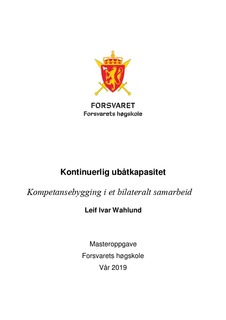Kontinuerlig ubåtkapasitet. Kompetansebygging i et bilateralt samarbeid.
Master thesis
Permanent lenke
http://hdl.handle.net/11250/2607939Utgivelsesdato
2019Metadata
Vis full innførselSamlinger
- Masteroppgaver [466]
Sammendrag
Oppgavens tittel, «Kontinuerlig ubåtkapasitet – kompetansebygging i et bilateralt samarbeid», omfatter de tre mest dagsaktuelle fokusområdene ved Ubåtskolen. En ubåtkapasitet opprettholdes gjennom materiell og personell og holdes relevant gjennom oppgraderinger og kompetansebygging. Norge har siden 2017 vært inne i et strategisk samarbeid med Tyskland vedrørende felles anskaffelse av nye identiske ubåter. Samarbeidet ble formalisert gjennom signeringen av den bilaterale avtalen vedrørende samarbeid om maritimt forsvarsmateriell. Avtalen har blant annet som mål å standardisere et felles opplærings-, oppøvings- og kontrollregime på de identiske ubåtene. Oppgaven tar for seg de mekanismer og faktorer som vil kunne påvirke den funksjonsrettede opplæringen og kompetansekontrollen i et bilateralt samarbeid.
Flernasjonalt samarbeid vil kunne bidra til en mer effektiv ressursutnyttelse, både hva gjelder kapabilitetsutvikling og operativ virksomhet. Flernasjonalt samarbeid er imidlertid krevende, og resultater vil være avhengig av vilje og evne i landene, til å tilpasse nasjonale krav. Et så tett integrert samarbeid, rundt en strategisk ressurs, er relativt unikt, selv blant allierte. Det er fordi alt fra reservedeler til opplæring og operasjonelle aspekter er utformet bilateralt fra starten. Samarbeidet vil også knytte de to ubåttjenestene sammen i flere tiår. I oppgaven vil samarbeidets egenart belyses i forhold til andre bilaterale- og flernasjonale avtaler innenfor rammen av forsvarssamarbeid i NATO og EU.
Rett kompetanse er essensielt for en kontinuerlig ubåtkapasitet. Det er to hovedfaktorer som gjør at kompetanse blir en viktig samarbeidsarena. For det første er det gjennom kompetansebygging et potensiale i forsvarssamarbeid en ikke har tatt ut i tidligere ubåtanskaffelser. For det andre er kompetansebygging enklere å samarbeide om enn andre områder. The title of, this thesis "Continuous submarine capacity - competence building in a bilateral cooperation", includes the three most relevant focus areas of the Submarine School. A submarine capacity is maintained through equipment and personnel, wich is kept relevant through upgrades and competence building. In 2017, Norway entered a strategic partnership with Germany, regarding the joint acquisition of new identical submarines. The cooperation was formalized through the signing of the Memorandum of Understanding concerning joint development, procurement, operations, maintenance and in-service support of naval defence materiel. One of the objectives of the agreement is to standardise common training, education and certification procedures on the identical submarines. This thesis examines the mechanisms and factors that could influence common training, education and certification procedures within a bilateral cooperation. Multinational cooperation could contribute to a more efficient use of resources, both in terms of capability development and operational effects. However, multinational cooperation is challenging and results will depend on the willingnes and ability of the countries to adapt their national requirements. Such an integrated partnership, around a strategic resource, is relatively unique, even amongst allies. The reasons are that everything from spare parts to training and operational aspects is designed bilaterally from the start. In addition, the cooperation will also link the two submarine services together for decades. This thesis will discuss the uniqueness of the cooperation in relation to other bilateral and multinational defence cooperation within the framework of NATO and the EU. The proper competence is essential for a continuous submarine capacity. The thesis claims that two factors make competence building an important area of cooperation. First, competence building has a potential in defense cooperation that has not previously been explored in submarine procurements. Second, competence building is easier to cooperate with than other areas.
